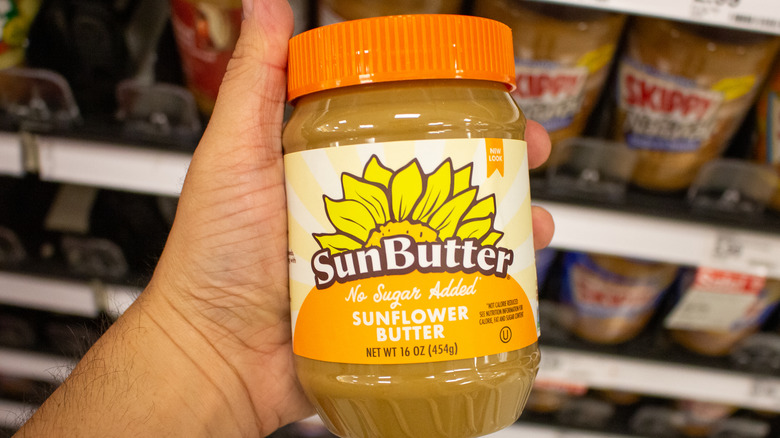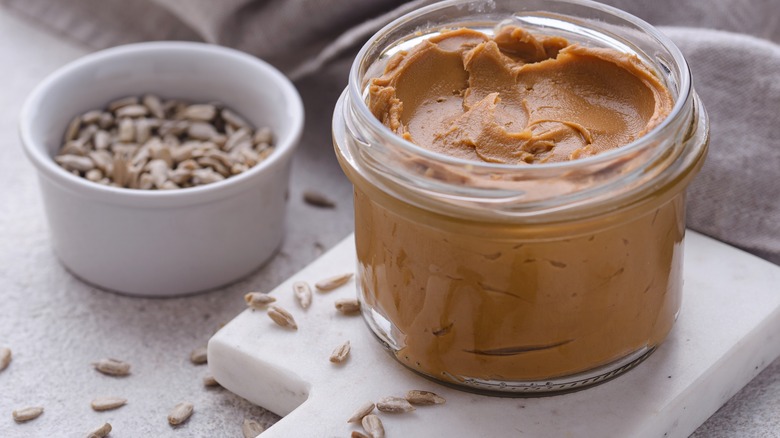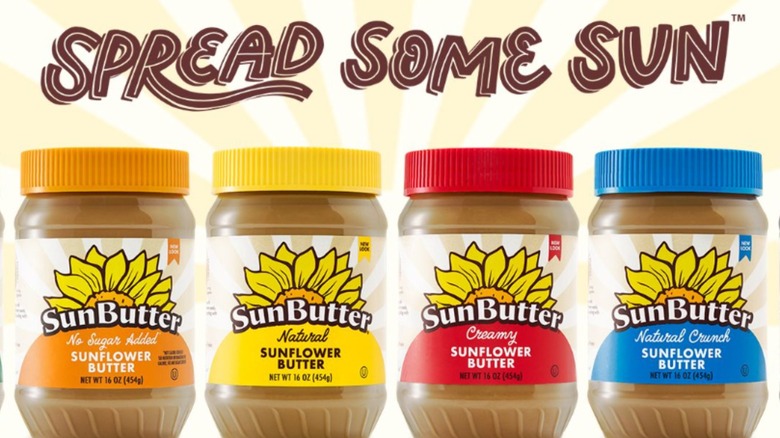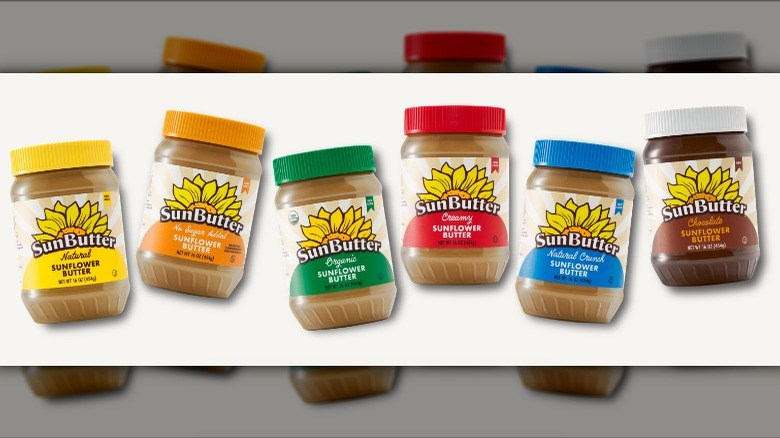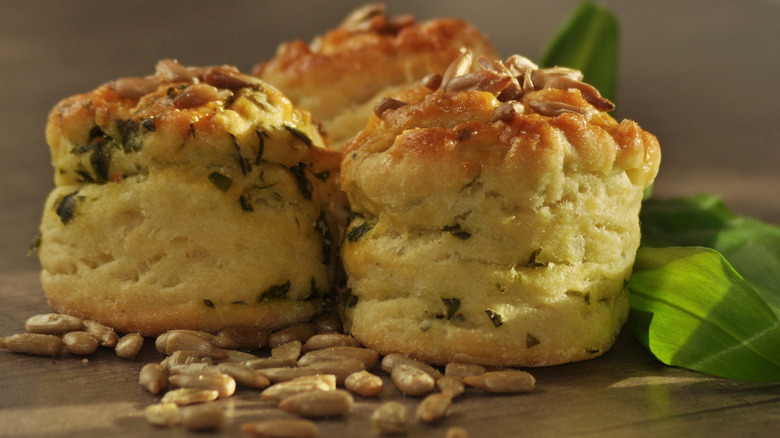The Untold Truth Of SunButter
A peanut butter and jelly sandwich is the perfect lunch for kids and adults alike. For some, adding a sliced banana creates a treat that brings back childhood memories, while scooping it up with some Fluff is a favorite go-to late-night snack for others.
Many people are aware that the spreadable, sweet, and salty treat is no longer limited to peanuts. The grocery store shelves now hold various brands and flavors of almond, hazelnut, and cashew butters, among others. While almond butter offers a grainy texture and sweet flavor, cashew butter is smoother with a more nutty taste, explains FOODSGUY.
If you've never noticed this side of the grocery aisle before, you can start with our list of favorite nut butters ranked worst to best and take it from there to find your fave. But, if you happen to be one of the estimated 32 million Americans with a nut allergy, you want to steer clear of these jars. And while this may disappoint you, all is not completely hopeless — enter SunButter.
What is SunButter?
If you live with any kind of nut allergy, chances are you already know what sunflower seed butter is. A spread similar to peanut butter, this allergen-friendly version is made from sunflower seeds. Per Verywell Fit, this food is made without any of the common food allergens: milk, soy, egg, wheat, peanuts, tree nuts, fish, and shellfish. Healthline reports that nearly 90% of all food allergy reaction is attributed to one of these foods.
SunButter is free of these top food allergens and sustainably sourced, per an announcement sent to Mashed. Furthermore, the SunButter website states its mission of being "committed to making delicious tasting sunflower butter made with simple ingredients, free from the top eight food allergens, and containing more vitamins and minerals than most nut butters."
Because of its low-risk allergen profile, SunButter is a good substitute for other nut butters. It can be used in place of peanut butter for anything from sandwiches to a baking ingredient. But how nutritious is it?
Is SunButter a nutritious alternative to peanut butter?
According to Healthline, peanut butter offers health benefits, but there are also some drawbacks that make peanut butter not as healthy as you think. While the spread is rich in protein and some essential nutrients, it's also high in calories. And depending on the type you choose, it can be high in sugar and fat as well. If you love adding peanut butter to crackers, mixing it with Nutella, or just eating it from the jar, it can be easy to overindulge, and the calories can add up quick.
On the other hand, according to Cedars-Sinai, one tablespoon of sunflower seed butter can give your body almost 25% of the daily recommended requirement for vitamin E, and it's also packed with healthy fats and magnesium. Furthermore, SunButter offers 7 grams of protein per serving. And, per the website, it has zero trans fats and 33.3% less saturated fat than most peanut butter. The sweet and salty spread is rich in iron, phosphorus, and zinc, too. The site also states that all SunButter products are Non-GMO project verified and certified Kosher.
Still, as with peanut butter, the SunButter calories can add up quick. Two tablespoons of the Natural SunButter spread contain 200 calories, and the same amount of the chocolate version is 180 calories.
Common questions about SunButter
Sunflower seed butter can be made in a few ways. Roasting, crushing, and adding a bit of oil, then processing it down is one way, per Culinary Hill. Culinary expert Jenna Edwards shares her tips in a YouTube video, in which she mentions that you can add salt, sugar, and honey. And the folks over at SunButter have professional methods of creating the variety of spreads the company offers.
SunButter shared with Mashed that it sources its seeds from "carefully vetted growers and suppliers" across the globe, ensuring that they are peanut- and tree nut-free. The SunButter facility itself, which is located in Fargo, North Dakota, is also kept free of the top eight common food allergens.
If you're wondering why SunButter isn't sold in glass jars, the company shares that, along with higher costs, glass is a safety hazard. Additionally, the plastic containers are BPA-free and require less energy to recycle than glass does. While SunButter does not require refrigeration, you can choose to do so if it's your preference. It's safe to consume SunButter within a year from the date of manufacture.
SunButter varieties
Per an announcement obtained by Mashed, the SunButter line is expanding. While the predominant ingredient in all of the jars is sunflower seeds, there are different versions of the spread. There's Natural SunButter, which is deemed the "go-to fan favorite" and can be used for spreading, dipping, or even adding to smoothies. Just note that it will separate a bit creating some oil on top, so it requires some stirring.
The Creamy SunButter variety is great for all the same reasons listed above, but per the website, it's currently the only SunButter product that doesn't require stirring. Then, there's the Natural Crunch SunButter, which has "seeds mixed into every bite." Like the Natural SunButter, this version contains 7 grams of protein, and the website suggests it can be used as a salad dressing, in baked goods, and even as an ice cream topping.
You'll also find an Organic SunButter variety, which the company states is made from "organic roasted sunflower seed[s]." And if you're watching your sugar intake, you can choose the No Sugar Added option.
The newest addition to the SunButter line up is Chocolate SunButter, described as a "deliciously creamy blend of rich cocoa and savory sunflower butter that is sweetly satisfying and nutritious." This spread contains 4 grams of sugar per serving, along with 6 grams of protein.
Using SunButter in recipes
The same way you'd use nut butter, SunButter can be used in a variety of recipes — Trader Joe's even offers a sunflower butter cookie. While you may not have thought of it before, this allergen-friendly ingredient can come in handy when you're making a potluck dish or whipping up baked goods for a party.
Per Kitchen Seer, when baking with SunButter as a replacement for other nut butters, a 1:1 ratio will work. The outlet does note that it's similar in texture to peanut butter, so when measuring, you'll still end up with a somewhat sticky situation.
This ingredient isn't limited to just baked goods, however. Greatist shares 19 fun recipes that use sunflower seed butter, including Pineapple SunButter Oatmeal and Grain-Free SunButter Banana Bread. The SunButter website also offers a plethora of recipes from Gluten-free Thai-Style Asparagus to Vegan Pumpkin Donuts with SunButter Maple Frosting.
